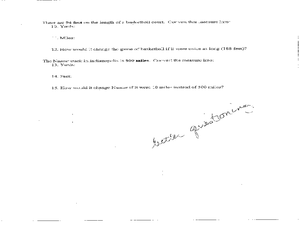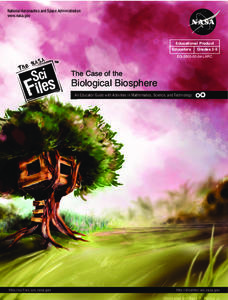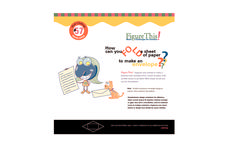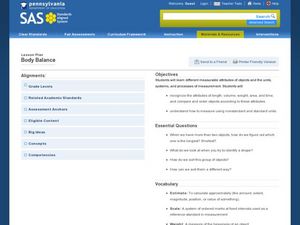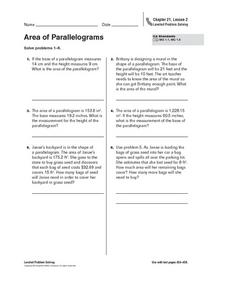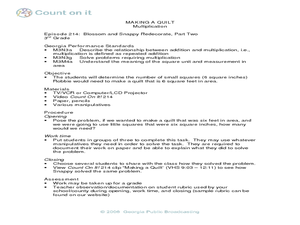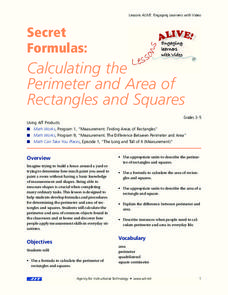Curated OER
Measurements in Sports
Sixth graders study measurement problems. In this geometry lesson, 6th graders discuss the different types of measurement used in sports and answer questions regarding measurement problems in sports.
Curated OER
Polygon Perimeters
Fourth graders practice finding the perimeter of shapes. In this measurement lesson, 4th graders review the meaning of perimeter and work in groups to draw polygons with differing perimeters. Students share their polygons with the class.
Curated OER
The Case of the Biological Biosphere: Health, Math, Technology
Students investigate various aspects of the human body in this imaginative Tree House Detective episode about the biological biosphere. In a series of They take measurements, analyze data, and use technology. The lessons revolve around...
Curated OER
Math Challenges
Students engage their critical thinking skills to solve challenging math problems. In these problem solving lessons, student work with tessellations, weights/measurement, reasoning, surface area, geometric shapes, and algebraic procedures.
Curated OER
Body Balance
Examine measurable characteristics of objects to build an understanding of the different ways you can discuss an object's size when comparing it to other objects. After whole group instruction, the class compares and organizes several...
Curated OER
Can You Build It?
Students investigate the concept of perimeter. They design there own figure and measure the perimeter of it. The lesson is given the context of the shape being a path that is traveled by a ladybug. This provides the shape of the plane...
Curated OER
Area of Parallelograms - Lesson 2
Use this area of parallelograms practice worksheet to have learner ssharpen their problem solving skills as they solve six story problems.
Curated OER
Shoe Showdown
Third graders use rulers to measure their shoe size in inches and centimeters. They then enter the class shoe measurements into an excel data base and graph the results of both to make the comparison.
Curated OER
Measurement
Students create two prisms out of the same paper. They calcuate the number of centimeter cubes needed to fill each prism. They discover the concept of volume.
Curated OER
Projectiles
Learners measure the angle and distance of an arc. In this projectile lesson, students observe arcs created by water guns, bow and arrows, and slingshots, then work in small groups and use protractors and strings to measure the angle and...
University of Houston
Volume for Rectangular Prisms
Upper graders define perimeter and area of a rectangle, estimate numbers of cubes and determine the maximum amount that will fit in a given space. In this math lesson, pupils complete related worksheet, build prisms and find volume and...
Curated OER
Exploring the Hudson in 1609
While this lesson focuses on a study of the Hudson River, it could be used as a template for a discussion of map skills, converting measurements, and plotting a route. The lesson includes vocabulary and other resources to make it a...
Curated OER
Generate Measurement Data Word Problems
Using a set of simple data, learners create a line plot to organize the information. This data includes only single-digit numbers and the highest number is six. Because the answer is explained and illustrated at the bottom, project this...
Curated OER
I Will Meet You In The Middle
Students use the 50 States Quarter Reversal as a context of learning a curriculum concept based from the state of Utah. They research the concepts of cause and effect. Also, they use customary units of measurement to find length and...
Curated OER
Area of Rectangles in Word Problems
Apply area calculations to everyday situations using these three word problems. Mathematicians must pay attention to the needs of each space, determining the largest or smallest area of several options. Consider expanding on this by...
Curated OER
Making a Quilt: Multiplication
Third graders explore their multiplication skills. They will use their problem solving skills to solve an everyday math problem that requires them to multiply numbers. This lesson incorporates the use a video titled "Blossom and Snappy...
Curated OER
Measure, Use of Measure
Young scholars explore how to convert one metric to to another. For this metric unit lesson students are given a worksheet and asked to answer the questions and give and explanation to the class of how they got their answer.
Curated OER
Working With Liquid Measurements
Young scholars determine how to compare and calculate liquid measures. In this liquid measurement instructional activity, students review the most common liquid measures such as ounces, teaspoons, cups, pints, quarts, and gallons.
Curated OER
Secret Formulas
Learners calculate the perimeter of rectangles and squares. They imagine trying to build a fence around a yard or trying to determine how much paint they need to paint a room. They also develop formulas and procedures for determining the...
NTTI
What Size Is It Anyway?
A fabulous plan on teaching basic concepts of measurement to young learners. Pupils use nonstandard units to measure length, practice using a ruler and a yardstick, compare the length of two objects, and perform estimations of length....
NTTI
Line 'Em Up!
Coordinate planes and Cartesian graphing systems are the focus of this math lesson. Learners use video, internet activities, and engage in hands-on activities in order to explore coordinate planes. The materials needed for this lesson...
Curated OER
Just a Minute!
Students put the standard measure of clock time -- the minute -- in perspective. This lesson can be modified for virtually any grade level. They write about what they learned about a minute as a result of the activities.
Curated OER
What a Square
Students examine the painting "Old Man With A Gold Chain" by Rembrandt. They identify geometric shapes in the painting, measure these shapes and compare the relationships of these measurements.
Education World
Teaching Students to Tell Time: Three Resources for Busy Teachers
Elementary schoolers develop time-telling skills, one skill at a time. They examine the connection between time on digital and analog (clock-face) clocks. An excellent lesson plan on teaching how to tell time!


